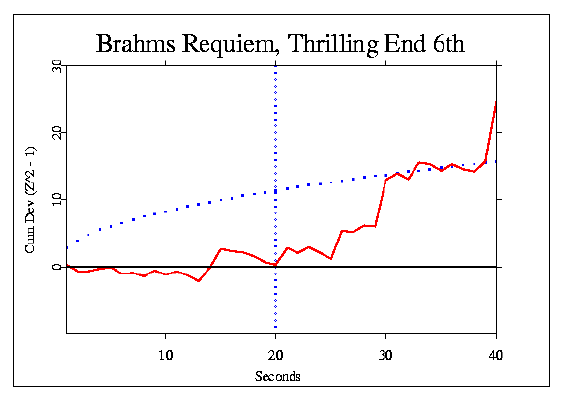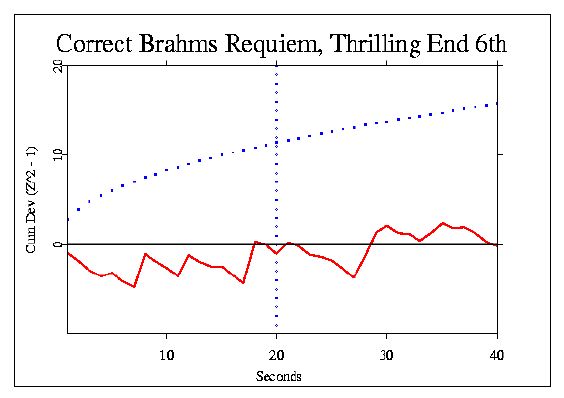|
One of the possible sources of the apparent "global consciousness" effect is an
anomalous influence of the experimenter. It is difficult to pin down such a
possibility, but occasionally oportunities arise that seem to offer some
insight. On March 24, 2000, I went to a rehearsal of the Deutsche Requiem by
Brahms, a magnificent chorale with orchestra. Near the end of the 6th, I
experienced a moment of the physiological "thrill" that sometimes comes from
especially beautiful music. As the enjoyment gave way to contemplation, it
occurred to me that it would have been nice to have a Fieldreg recording, and
this led immediately to the idea of checking the GCP data at the time. So I
noted the time fairly accurately and resolved to check the data around that
time when I had a chance. The noted time was 15:25:20 EST !! I just realized
that the data I pulled (and which show a nice effect!) are UTC time. Well,
I'll get the correct data shortly. This may simply amplify the "experimenter
effect" point I want to make here. The (wrong) data show a significant outcome
for the 40 second period I chose to use (15:25:00 to 15:25:39)
centered on the noted moment. The first following graph shows these data, which have
Chisquare = 64.65 on 40 df for a p-value of 0.008.

Having realized the error, there was no choice but to accept it and go
ahead with the correct analysis, using the appropriate UTC time equivalent
(20:25:00 to 20:25:39). The result is a classically non-significant cumulative
Chisquare (39.805, 40 df, p = 0.479), as can be seen in the next figure.

What does this mean? Of course it may all be subsumed under statistical
fluctuation, but if taken at face value, the "successful" result with
irrelevant data obviously cannot be interpreted as representing some effect of
the thrilling moment, and instead would have to be seen as a reflection of the
experimenter's desire to have a striking and "meaningful" result. The
correction washes that momentary success from the slate, and replaces it with
a result that might best be regarded as an indicator that the experimenter
needs to be more
careful, both in selecting useful applications and in collecting the
appropriate data.
|